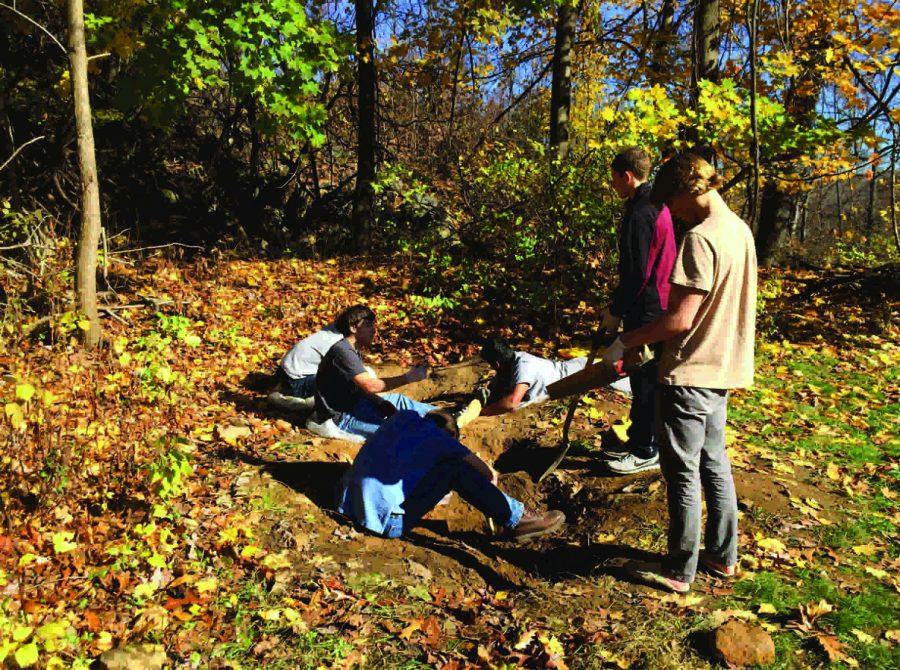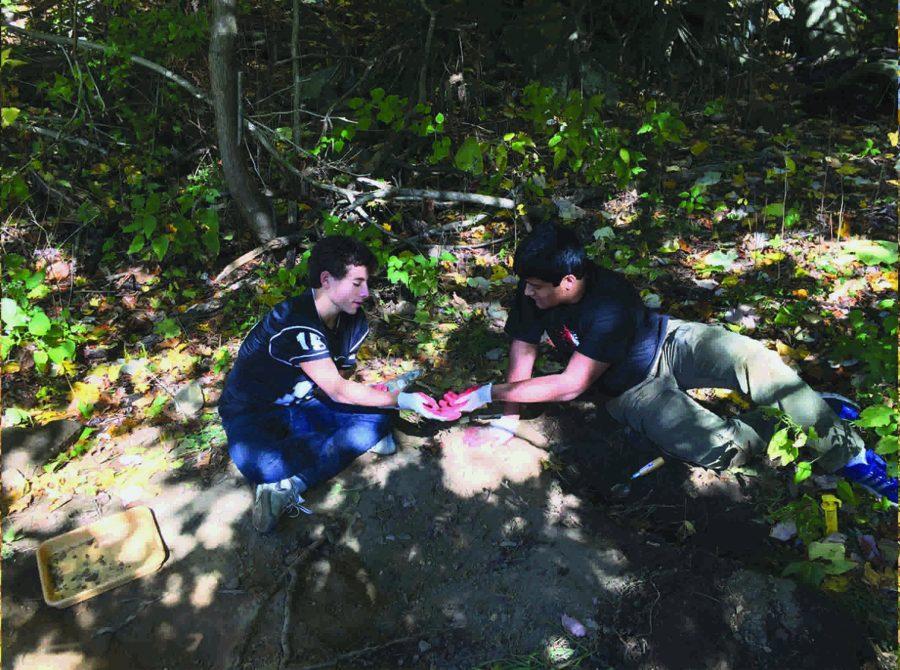Latin IV Digs Deeper into the Ancient World
Credit: Adrianne Pierce
Latin IV students excavate artifacts at their new archaeological dig site.
May 30, 2016
On a Day 4 during the 70-minute period, if you venture down to Hackley’s Tennis Courts and walk left towards the woods, you may come across a group of six teenage boys with shovels digging in the dirt, accompanied by their teacher. This scene is the Latin IV class and Dr. Pierce working in their carefully planned and curated archaeological digging site, which has been excavated since last spring.
After attending a Professional Development seminar at the State Museum in Albany two years ago, Classics Department Head and Latin Teacher Dr. Adrianne Pierce began incorporating archeology into all of her Latin classes. She then decided to make it a large focus of the Latin IV curriculum and to open up an archeological dig site last spring.
“It was sort of a mutual decision with the Latin IV class to do more archeology, and it was so much fun to do the little archaeological experiments we did in class, that it seemed logical to do more and to also open up a dig site so we could have some practical experience,” said Dr. Pierce regarding the class’ decision to focus more on archaeology. The class has found various artifacts at the dig site, such as pottery, dinnerware, glass, metal, a fully intact bottle, and a coin from the year 2000, allowing them to date part of their dig site. They have even found rocks which have been identified as volcanic by Middle School Science teacher Ms. Melissa Boviero, suggesting that in the past there has been some sort of burning of organic material at the site.
In addition to reading Cicero’s first Catilinarian Orations, learning about rhetorical techniques, and studying the poetry of Horace, Catullus, and Ovid, the class has been learning more about the world of archaeology. The Latin IV students are taking a MOOC class (Massive Open Online Course) through the University of Portsmouth which focuses on the excavation efforts of archeologists of the ancient Roman port “Portus”. In addition to this online course, the class is reading Latin passages about Portus. They are reading the works of Pliny, Vitruvius, and Cassius which give background on the port, in order to gain more insight into what Portus was like during the height of the Roman Empire. Regarding the link between their archaeological digging and their classwork, Dr. Pierce said, “We are sort of mirroring what they are doing at Portus in a way right here at Hackley.”
Dr. Pierce and her Latin students have also been reading about archaeological techniques and how to evaluate their artifacts, as well as how to properly curate and catalog them. Additionally, they have been learning about various archaeological sites around the world and the groundbreaking work archaeologists are doing by reading archaeology magazines, news articles, and watching episodes from the archeology program, “Time Team.”
“Doing archaeology in Latin class raised my awareness about the importance of looking at our past. Archaeology also was a great change of pace in our class. I think it would be a great thing to continue doing, and other classes and departments should do it too,” said sophomore Latin IV student Liam Bogart. The students have found the process of finding artifacts and identifying them interesting and thrilling. “The actual digging process is very fun even when we don’t find any artifacts, but when we do, it is very exciting because it tells us something about the environment of the area we are digging in,” said sophomore Vinay Bijoor. While they utilize the dig site to learn more about the work archaeologists do and how to search for artifacts, they are also hoping to learn more about Hackley and its history through the artifacts they excavate. “We are looking for any type of artifact which could tell us anything about Hackley and its history,” said Vinay.
As the school year comes to a close, the current Latin IV students will miss digging for artifacts and learning about the world of archeology. But as Dr. Pierce lays a tarp over the dig site for the summer, it will be removed in the fall for a new group of eager Latin IV students to use in the hopes of finding artifacts, gaining more insight into the work of archeologists and uncovering the secrets of the ancient world.


